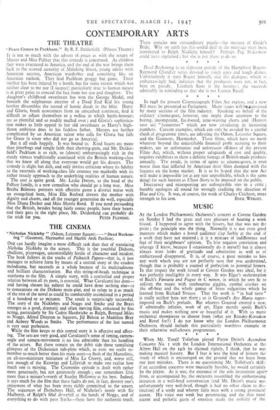THE CINEMA
ing " (Gaumont, Haymarket and Marble Arch Pavilion).
ONE can hardly imagine a more difficult task than that of translating Nicholas Nickleby to the screen. This is the youthful Dickens, ebullient, picaresque, uncontrollably fertile of character and incident. The book follows in the tracks of Pickwick Papers—that is, it just manages to achieve form by means of a central story of the crudest melodrama, but succeeds as a whole because of its multitudinous and brilliant characterisation. But this string-of-beads technique is anathema to the film. A simple story, with a controlled and proper relation between all its parts, is essential. What Cavalcanti has done— and having chosen his subject he could have done nothing else—is to conoeptrate on the Dickens main plot, and to relate to it as much of the rest of the novel as could be comfortably assimilated in a period of a hundred or so minutes. The result is surprisingly successful. The. story of the Nicklebys and Noggs and Smike and the Brays emerges as a good, dramatic and often moving film, enhanced by fine acting, particularly by Sir Cedric Hardwicke as Ralph, Bernard Miles as Noggs, Alfred Drayton as Squeers, Jill Balcou as Madeline Bray and Aubrey Woods as Smike. The performance of the last named is very near perfection.
While the film keeps- to this central story it is effective and affect- ing. The sets are very good, and Cavalcanti's sense of timing, camera- angle and camera-movement is no less admirable than his handling of the actors. But there remain on the debit side those tantalising glimpses of the Dickensian sub-plots which, as ever, we really re- member so much better than his main story—a flash of the Mantalinis, an all-too-miniature miniature of Miss La Creevy, and, worse still, just enough of the Kenwigs and Lillyvick to make one realise how much one is missing. The Crununles episode is dealt with rather more generously, but not generously enough ; one remembers little more than a minute's-worth of Stanley Holloway at his best. Indeed, it says much for the film that these faults do not, in fact, destroy one's enjoyment of what has been more richly committed to the screen. The sequences of Dotheboys Hall, of Nicholas's tussle with Sir Mulberry, of Ralph's final downfall at the hands of Noggs, and of everything to do with poor Sm.lre—these have the authentic touch. There remains one extraordinary puzzle—the mystery of Gride's Bride. Why on earth has this sordid deal in the marriage mart been transferred to Ralph Nickleby himself? Perhaps Peg SEderskew could have explained ; but she is not there to do so.
Dead Reckoning is an elaborate parOdy of the Humphrey Bogart- Raymond Chandler series devoted to tough guys and tough dames. Unfortunately it stars Bogart himself, and the dialogue, which is embarrassingly bad, indicates that the producers were not, in fact, bent on parody. Lizabeth Scott is the heroine ; she succeeds admirably in reminding us that she is not Lauren Bacall.
In 1948 the present Cinematograph Films Act expires, and a new Bill must be presented to Parliament. Many issues will begpanvassed by many sections of the film industry. Speaking on behalf of the ordinary cinema-goer, however, one might draw attention to the boring, incompetent, flat-footed, time-wasting shorts and (Heaven save us) " featurettes " which are now circulating in increasing numbers. Current examples, which can only be avoided by a careful check of programme times, are infesting the Odeon, Leicester Square, and the Gaumont, Haymarket. These films, which have no merit whatever beyond the unjustifiable financial profit accruing to their makers, are an unfortunate and unforeseen offshoot of the present Films Act, which, without proper safeguards of cost and quality, requires exhibitors to show a definite footage of British-made products annually. The result, in terms of agony to cinema-goers, is even worse than that inflicted by American short films dumped with the features on the home market. It is to be hoped that the new Act will make it impossible (or at any rate unprofitable, which is the same thing) for such horrors as Ulster Story to be imposed on the public. Inaccuracy and misreporting are unforgivable sins in a critic ; humble apologies all round for wrongly crediting the direction of Hue and Cry. It was, of course, the work of Charles Crichton, more


































 Previous page
Previous page